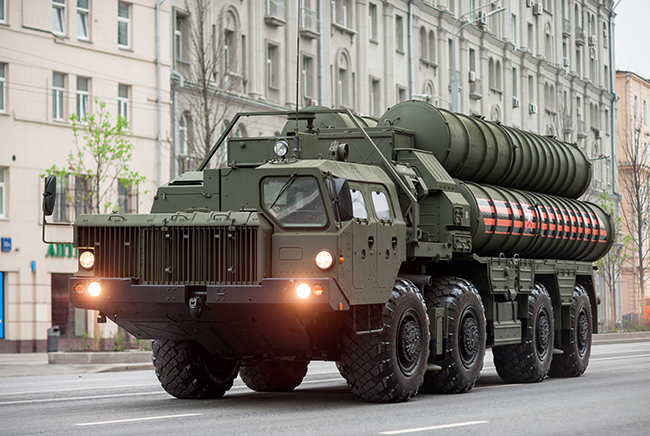Senate Republican Whip John Thune (R-S.D.) has a novel approach to solving some of the U.S.’s problems with fellow NATO member Turkey: Sell us your Russian S-400 air defense system, and you can come back into the F-35 program.
Thune inserted language into the Senate’s Fiscal 2021 National Defense Authorization Act bill to allow the Army to buy the S-400, also known as the Triumf, from Turkey, using missile procurement money. In exchange, Turkey, which was expelled from the F-35 program over its purchase of the S-400, could re-enter the program and resume providing more than 100 parts and sub-assemblies for the fighter, and also serve as a regional repair hub for it.
The Senate Armed Services Committee’s version of the NDAA already mentioned the Turkish F-35 situation, allowing the Air Force to take the six F-35As Turkey bought, but never took delivery of, and use them as part of USAF’s own F-35 fleet. The jets are highly similar to the models USAF operates among its combat F-35 squadrons.
House Armed Services Committee chairman Rep. Adam Smith (D-Wash.), speaking with defense reporters June 30, said he’s “very much open” to Thune’s idea, but isn’t sure it would fix the relationship with Turkey, which is troubled by other political factors, as well.
“I don’t know if money’s really the issue, here.” Smith said. “I don’t know that that would resolve it. I think this is more of an internal decision that [Turkish President Recip] Erdogan has made about his belief that he needs that system.” Smith said he’d “love to” find a way to reconcile with Turkey over the S-400. “However, problematic our relationship with Turkey may be, they are an incredibly important … partner” on “all manner of different issues.” He confessed to being “skeptical” that Thune’s approach would work.
Turkey reportedly paid more than $2.5 billion for the S-400, but lost billions in potential work on the F-35 as a result of going ahead with the deal. NATO leaders and other F-35 partner countries concurred with the U.S. decision to expel Turkey from the Joint Strike Fighter program, because operating the stealth aircraft in close proximity to the S-400 would give Russian technicians valuable insights about how to detect and defeat the F-35. The F-35 is flown by the U.S. and more than a dozen partners or allies, many in NATO.
Thune’s approach could flip the potential damage of the S-400 being fielded by a NATO country. If Turkey agreed—and was willing to endure the certain souring of relations with Russia—U.S. aircraft could practice against one of the most sophisticated threats they face in potential combat. The ability to examine the system in detail would also likely reveal ways to defeat or fool it. China bought its first two S-400s—NATO codenamed SA-21 Growler—in 2018 and is developing an indigenous copy of the system, as well.
Thune’s olive branch was offset by Senate Foreign Relations chair Jim Risch (R-Idaho), who inserted his own amendment to the NDAA about Turkey. Risch’s amendment would compel the Trump administration to follow through on the Countering America’s Adversaries Through Sanctions Act, which mandates that any country making a major purchase of weaponry from Russia will face sanctions. Although the S-400 certainly counts under the CAATSA provisions, the Trump administration hasn’t enforced it, reportedly because Trump believes he enjoys a close relationship with Erdogan and doesn’t want to jeopardize it.

